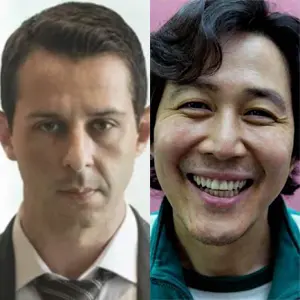Succession and Squid Game are telling the same story, but one is more realistic than the other
-

The HBO dramedy and the Korean Netflix global sensation "are about survival in one fashion or another," says Libby Hill. "Both feature gut-wrenching twists and betrayals. Both are about systemic abuse, either by society or family, and the hopelessness left in its wake. But there is one important distinction between the series. Though both are deemed dramas, closer examination suggests that one of the shows traverses primarily in fantasy and the other in reality. It just might not be the ones you think. At first glance, Squid Game might seem like a nightmare come to life, its violence and gore ripped from the most fantastical wells of fear and anxiety your brain has to offer, all oversized animatronic dolls, radicalized Shy Guys, and delicate glass bridges to nowhere. Sure, those are alluring elements of the series, but there is something very real about the atmosphere the show creates. Something familiar. As income inequality in the United States grows, particularly in the wake of a global pandemic, more and more people are becoming familiar with living paycheck to paycheck, the invoice and wait realities of freelance work, and the crushing grind of a gig economy. More people are familiar with calls from debt collectors and final notices on bills. They may not owe money to South Korean loan sharks who are more than willing to resort to violence, but paying 26 percent interest on their credit card might be even more painful. Squid Game, like Bong Joon-Ho’s Best Picture-winning film Parasite before it, gives insight into the income inequality of South Korea, and audiences worldwide are transfixed. It resonates because of the familiar, fleeting shadows that flicker on the walls, ashy gray smears of desperation and fear as those with less are forced to serve — or entertain — those with much, much more. Conversely, Jesse Armstrong’s Succession focuses wholly on a single family, the Roys. Over his life, Logan has built an old media empire, perpetually teetering on the verge of ruin, as his children — Kendall, Connor (Alan Ruck), Shiv (Sarah Snook), and Roman (Kieran Culkin) — frantically rearrange deck chairs on the Titanic for their shot at the throne, fueled by love, hate, fear, and rage. But this is no staid family drama. No weepy singer/songwriter songs underscoring hugs a la Parenthood. No tear-jerking flashbacks in the fashion of This Is Us. No grappling with the looming specter of death in the vein of Six Feet Under. While the family dynamics in play with Succession are recognizable, the circumstances in which they unfold are not. The Roy family is beyond affluent. Their wealth exists in a tier unimaginable to most people, elevating them to the level of gods among men, for whom money is so plentiful it has become autonomic. Money is not a conscious part of the Roys’ existence because it doesn’t have to be. Money has always been, money will always be."
TOPICS: Succession, HBO, Netflix, Squid Game
